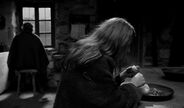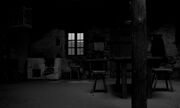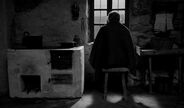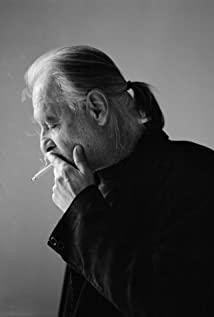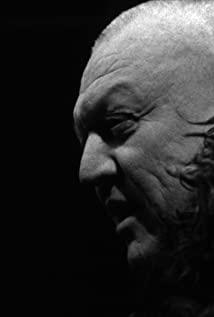"The Horse of Turin" is a typical formalist (abstract) film. There are few lines in the film and the pace is slow. This is a "God is dead" (Nietzschean) story. Director Bella Tal reversed God's six-day creation, which seemed to show a story of extinction.
On the fifth day, when the light went out and could not be lit at all, it was God's death. Perhaps, it doesn't matter that God dies, only the origin of the artificial world (the ultimate ontology in ontology) dies. The story of the seventh day did not unfold. Perhaps it corresponds to the opening of the seventh seal in the Bible. The coming of the judgment at the end of the day is the destruction of the world. In my opinion, the world in the film may be regarded as the ultimate source of nothingness, from nothingness, and finally to nothingness.
According to Nietzsche's thought, the father and daughter in the movie can actually be regarded as the children of God. They do not know or accept that "God is dead", and are disciplined by "God" to become decadent last man, the will to power (will to life) breath was suppressed. The daughter recites the Bible and looks up to God reverently. But "God" was silent and did not trigger any miracles. They were still trapped in the wasteland, unable to escape, until they died.
Contemporary philosopher Jacques Rancière and American art critic Susan Sontag both think Bella Tarr's films are "happy". But many people think that his films are full of nothingness and pessimism. I agree with the former statement. At least this is the case. The spiritual core of The Horse of Turin is Nietzschean, not pessimistic. Nietzsche was influenced by Schopenhauer's pessimism in the early days, but only absorbed Schopenhauer's voluntarism, but the spirit is the opposite of pessimism, which is a positive Dionysian spirit. Later, Nietzsche rejected even voluntarism, wanting to kill the noumenon of the will (will is the origin of the world) that he advocated earlier, and then proposed that "God is dead" ("God" is the origin of all types of the world). Corresponding to the movie, it is the six-day extinction that reverses the six-day creation of God, and the lights go out to symbolize that God is dead. In Nietzsche's philosophy, only the death of God is the complete spiritual liberation and the possibility of "superman". The reason why Nietzsche cried for the Torino horse who was beaten and abused was because he saw himself in the Turin horse, and saw the self persecuted by the last people invisibly. The Turin horse in the movie, who insists on not drinking or eating, is the incarnation of Nietzsche. He is using the superhuman philosophy to fight against the reality of nothingness. Such Nietzsche felt happy, so before he died, he said to his sister: "Elizabeth, why are you crying? Are we not happy?"
Yes, Nietzsche lived life as a tragic art like the Horse of Turin. They are tough, proud, unyielding, stupid and miserable in the eyes of the last man, but they are actually extremely happy - able to experience the test of eternal reincarnation (life repeats countless times and still love life). This is the ultimate romance! "The Horse of Turin" is actually a beautiful and sublime tragedy of contemporary nihilism!
View more about The Turin Horse reviews



